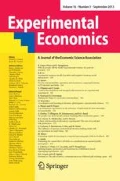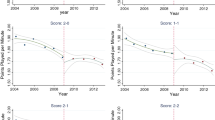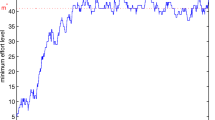Abstract
We use experiments to investigate the efficacy of recommended play and performance bonuses in resolving coordination failures in a stag-hunt type coordination game with multiple Pareto-ranked equilibria, often referred to as a “weak link” game. Participants routinely find it difficult to coordinate to the payoff-dominant outcome in such games. We look at performance in both fixed and randomly re-matched groups. A recommendation to the payoff-dominant outcome is successful in resolving coordination failures with fixed groups but only when this recommendation is “common knowledge” in the sense that all members of the group receive the same message and it is read out loud for everyone to hear. Resolving coordination failures is harder with randomly re-matched groups and the greatest success is achieved only upon payment of a performance bonus.
Similar content being viewed by others
References
Antonopoulos, C., Chau, L., Chaudhuri, A., Hahn, E., & Min, S. (2002). Efficiency breakthrough: conversion from almost common to common knowledge in the minimum effort game. Working Paper, Department of Economics, Wellesley College, Wellesley, MA, May 2002.
Bangun, L., Chaudhuri, A., Prak, P. & Zhou, C. (2006). Common and almost common knowledge of credible recommendations in a coordination game. Economics Bulletin, 3(1), 1–10.
Brandts, J., & Cooper, D. (2006a). A change would do you good … an experimental study on how to overcome coordination failure in organizations. American Economic Review, 96(3), 667–693.
Brandts, J., & Cooper, D. (2006b). Observability and overcoming coordination failures in organizations: an experimental study. Experimental Economics, 9(4), 407–423.
Brandts, J., & Cooper, D. (2007). It’s what you say and not what you pay: an experimental study of manager-employee relationships in overcoming coordination failure. Journal of the European Economic Association, 5(6), 1223–1268.
Brandts, J., & MacLeod, W.B. (1995). Equilibrium selection in experimental games with recommended play. Games and Economic Behavior, 11(1), 36–93.
Chaudhuri, A. (2009). Experiments in economics: playing fair with money. London/New York: Routledge.
Chaudhuri, A., Schotter, A., & Sopher, B. (2009). Talking ourselves to efficiency: coordination in inter-generational minimum games with private, almost common and common knowledge of advice. Economic Journal, 119, 91–122.
Chwe, M. (2001). Rational ritual: culture, coordination and common knowledge. Princeton: Princeton University Press.
Clark, K., & Sefton, M. (2001). Repetition and signalling: experimental evidence from games with efficient equilibria. Economics Letters, 70(3), 357–362.
Cooper, R., DeJong, D., Forsythe, R., & Ross, T. (1990). Selection criteria in coordination games: experimental results. American Economic Review, 80(1), 218–233.
Devetag, G., & Ortmann, A. (2007). When and why? A critical review of coordination failure in the laboratory. Experimental Economics, 10(3), 331–344.
Goeree, J., & Holt, C. (2001). Ten little treasures of game theory and ten intuitive contradictions. American Economic Review, 91(5), 1402–1422.
Hamman, J., Rick, S., & Weber, R. (2007). Solving coordination problems with ‘all-or-none’ group level incentives. Experimental Economics, 10(3), 285–303.
Holt, C. (2009). University of Virginia Veconlab. Online experiments available at: http://veconlab.econ.virginia.edu/admin.htm.
Knez, M., & Simester, D. (2001). Firm-wide incentives and mutual monitoring at Continental Airlines. Journal of Labor Economics, 19(4), 743–772.
Van Huyck, J., Battalio, R., & Beil, R. (1990). Tacit coordination games, strategic uncertainty, and coordination failure. American Economic Review, 80(1), 234–248.
Van Huyck, J., Gillette, A., & Battalio, R. (1992). Credible assignments in coordination games. Games and Economic Behavior, 4(4), 606–626.
Author information
Authors and Affiliations
Corresponding author
Electronic Supplementary Material
10683_2010_9245_MOESM1_ESM.doc
Appendix: Instructions for EXEC 397 “Recommended Play and Performance Bonuses in the Minimum Effort Coordination Game” by Ananish Chaudhuri and Tirnud Paichayontvijit (DOC 46KB)
Rights and permissions
About this article
Cite this article
Chaudhuri, A., Paichayontvijit, T. Recommended play and performance bonuses in the minimum effort coordination game. Exp Econ 13, 346–363 (2010). https://doi.org/10.1007/s10683-010-9245-5
Received:
Accepted:
Published:
Issue Date:
DOI: https://doi.org/10.1007/s10683-010-9245-5




